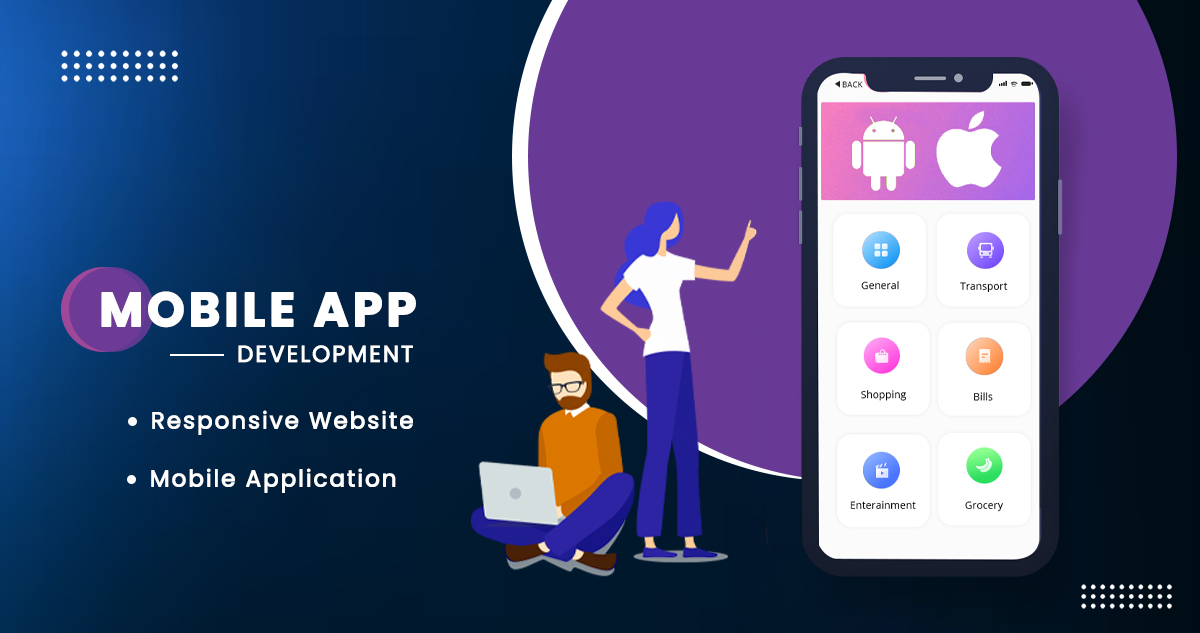
The Best Mobile App Development Services
Mobile app development service involves designing, creating, testing, and launching software applications for mobile devices such as smartphones, tablets, and wearable devices for enhanced customer engagement and brand visibility.
Custom mobile apps are tailor-made mobile applications created to address the requirements of a specific audience rather than a massive group of people. Custom mobile app development provides the functionality and features that non-specific off-the-shelf solutions cannot.
Business Benefits of Custom-made Mobile Apps.
- Offers Full Control Over App Development And Maintenance
- Easy To Emphasize The Competitor's Advantage
- Scalability To Meet Growing Business Needs And Incorporate New Features
- Access To App-native Technology Boosts Speed And Performance
- Seamless Integration With Third-party Software
- High-level Of App Support And Maintenance From The Vendor's Side
- Improved Data Security And Protection Against Cyber-attacks
Mobile Application or Responsive Website?

Mobile Application
- Everyday Use and Convenience
- Easy To Download, Install, and Access Apps from Anywhere
- Highly Personalized User Experience
- Mobile-Only Design
- Built-in Performance and Optimization

Responsive Website
- Average Convenience
- Requires internet connectivity to view or interact with content
- More Focus on Ads, Services, and New Users
- Mobile-first Design
- Need to Optimize Content for Mobile
Factors to Consider When Developing a Mobile App
- Research thoroughly to understand the market, customer demands and trends, so you can plan better and prepare a robust application from the very beginning.
- Identify the target audience for your application and determine how the app can meet their expectations and add value to their lives.
- Select the best-suited platform and development methodology to build your mobile application based on the usage patterns and OS preferences of your target audience, budget considerations, and app features.
- Plan your app development process project management, app design and architecture, development methodology, testing, enhancement, deployment, monitoring, and ongoing maintenance.
- Focus on delivering a flawless user experience with faster load time, user-friendliness, ease of navigation, data efficiency, battery usages, security, and superior quality customer experience and service.
- Test your app end-to-end before launching and dust out all the nooks and crannies to make it a strong business tool which can effectively connect you with your customers.
- Market your mobile app in a way that it gets a lot of reach from the word go. Create your marketing strategy based on your industry, offerings, and your potential users.
Choosing the Right Platform for Mobile App Development
Mobile application development platforms differ according to the operating system (OS) they cater to, namely Android, iOS, and Hybrid.
Reasons to Choose Android Mobile App Development
- Low Investment and High ROI
- Easy to Integrate with Third-Party Software
- Plenty of Open Source Libraries and Frameworks to Accelerate Development
- Increased Adoption Among Users Since Android Devices Are Highly Affordable And The Os Dominates The Global Smartphones Market Share
- Maximum Customization Features, Scalability, Flexibility, and Versatility
- Easy to Port Android Applications to Other Platforms Like Ubuntu And Symbian
Reasons to Choose iOS Mobile App Development
- Your Potential User Base Comprises A Large Number Of Apple Iphone And Ipad Users
- Develop A Consistently Performing Mobile App With Fast And Fluid User Experience
- Leverage Best-in-class Hardware Components With The Finest Design And Masterpiece
- Extreme Level Of Security, A Solid Shield To External Threats, Virus, And Malware
- Enhance Brand Recognition And Upgrade Business Objectives By Reaching Out To Tech-savvy Audience
Reasons to Choose Hybrid Mobile App Development
- Reach A Larger Audience Within A Short Span Of Time
- Cannot Hire Multiple Teams For Developing On Different Platforms
- Leverage Open Source Frameworks And Not Just Limit To Proprietary Development Platforms
- Need More Features Than A Web App, While Not Restricting To A Web Browser Capabilities
- Want To Reduce Development And Maintenance Costs
Different Mobile Applications for Businesses
There are four common types of mobile applications developed by businesses worldwide:
- Native Mobile Applications:Native Mobile Applications: Platform-specific applications developed using the programming languages, SDKs, tools, and frameworks provided by the platform itself. These apps are designed to run natively on the operating system of the device such as iOS or Android. Native mobile apps are faster, more reliable, and offer offline capabilities.
- Hybrid Mobile Applications:Hybrid mobile applications are built using standard web technologies such as JavaScript, CSS or HTML5, combining the elements of both native as well as web applications. Developers can leverage plugins and APIs to integrate web technology with native app features. Hybrid mobile apps are faster to develop and easier to maintain.
- Cross-platform Mobile Applications:This type of app works across platforms using a single code base which makes it compatible to run on different operating systems. A cross-platform app can be written using different programming languages, but it's compiled to run like a true native application running directly on the device's OS. It's easy to build and maintain cross-platform apps.
- Progressive Web Applications: PWAs present an alternative approach to traditional mobile app development by avoiding the need for app store delivery and installations. They are cheaper, more secure, faster, and easier to develop. They operate via a browser, but act like native apps, and provide users an “app-like” experience by leveraging browser capabilities.
